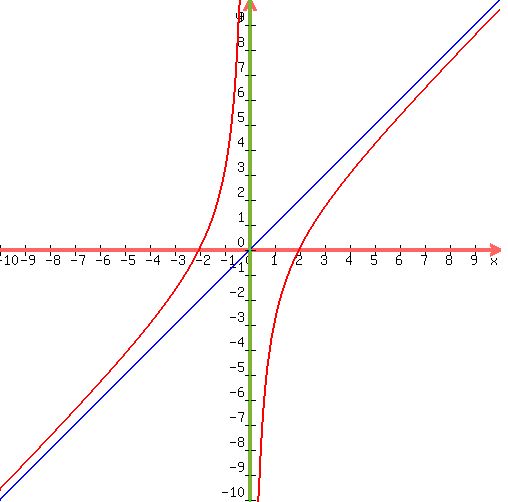Question 132442: Discuss completely (as in the textbook) and draw the graphs of the following rational functions.
2. 
Answer by jim_thompson5910(35256)   (Show Source): (Show Source):
You can put this solution on YOUR website! I'm not sure as to what you mean by "Discuss completely (as in the textbook)", but I'm assuming that you want to find the asymptotes right?
 Start with the given function Start with the given function
Looking at the numerator  , we can see that the degree is , we can see that the degree is  since the highest exponent of the numerator is since the highest exponent of the numerator is  . For the denominator . For the denominator  , we can see that the degree is , we can see that the degree is  since the highest exponent of the denominator is since the highest exponent of the denominator is  . .
Oblique Asymptote:
Since the degree of the numerator (which is  ) is greater than the degree of the denominator (which is ) is greater than the degree of the denominator (which is  ), there is no horizontal asymptote. In this case, there's an oblique asymptote ), there is no horizontal asymptote. In this case, there's an oblique asymptote
To find the oblique asymptote, simply use polynomial division to find it. The quotient of  is the equation of the oblique asymptote is the equation of the oblique asymptote
__x_________
x | x^2 - 4
x^2
-----
- 4
note: in this case, we don't need to worry about the remainder
Since the quotient is  , this means that the oblique asymptote is , this means that the oblique asymptote is 
--------------------------------------------------
Vertical Asymptote:
To find the vertical asymptote, just set the denominator equal to zero and solve for x
 Set the denominator equal to zero Set the denominator equal to zero
So the vertical asymptote is 
Notice if we graph  , we can visually verify our answers: , we can visually verify our answers:
 Graph of Graph of  with the oblique asymptote with the oblique asymptote  (blue line) and the vertical asymptote (blue line) and the vertical asymptote  (green line) (green line)
|
|
|